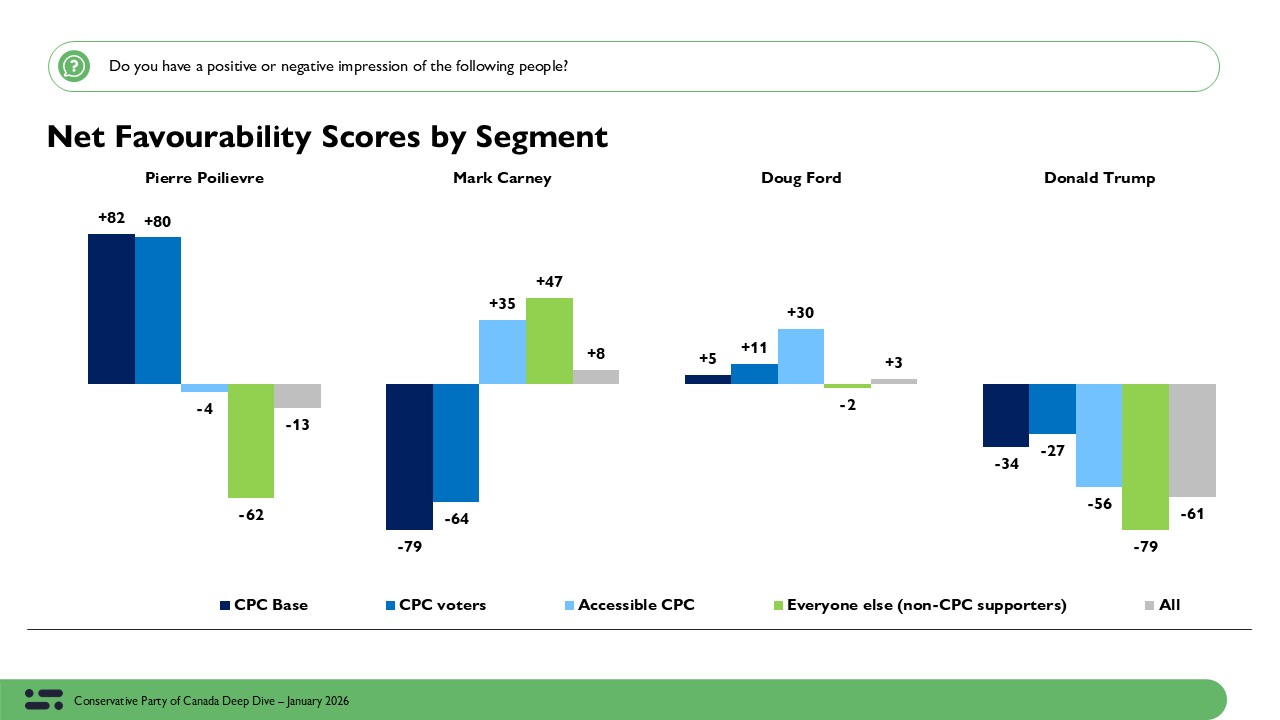What do Canadians think about AI: A Tool for Progress or a Threat to Stability?
September 19, 2025
Artificial intelligence is rapidly emerging as one of the most disruptive forces of our time, transforming Canada’s economy, workplaces, and daily life. Its accelerating growth brings exciting opportunities to advance healthcare, education, and innovation, while also sparking serious public concerns about job security, privacy, and the speed of change.
For Canada, AI represents both promise and risk. While it is seemingly a movement that cannot be stopped, its direction is not yet clear. As the Carney government signals its intent to make AI a national priority, the challenge will be to guide this transformation in a way that builds trust, protects people, and ensures the benefits are shared widely.
The decisions made now will shape how Canadians experience this technological revolution, whether AI becomes a tool for progress and prosperity, or a source of fear and division. Understanding how Canadians feel about AI – their hopes, fears, and expectations – will be essential for policymakers as they navigate one of the most disruptive shifts of our time.
The Promise and Peril of AI
Canadians are deeply divided between hope and fear when it comes to AI’s future. Nearly half (47%) believe AI has the power to drive progress and improve lives, but only if it is managed with strong safeguards and oversight. At the same time, 37% view AI like a Pandora’s box – a force that, once unleashed, will be impossible to control.
This cautious optimism cuts across the political spectrum, with 43% of Conservatives, 49% of Liberals, and 48% of NDP supporters agreeing that AI’s benefits are possible, but only under strict management. This points to a potential crossroad: Canadians see the transformative potential of AI, but fear that without decisive action, its risks could quickly spiral out of control.
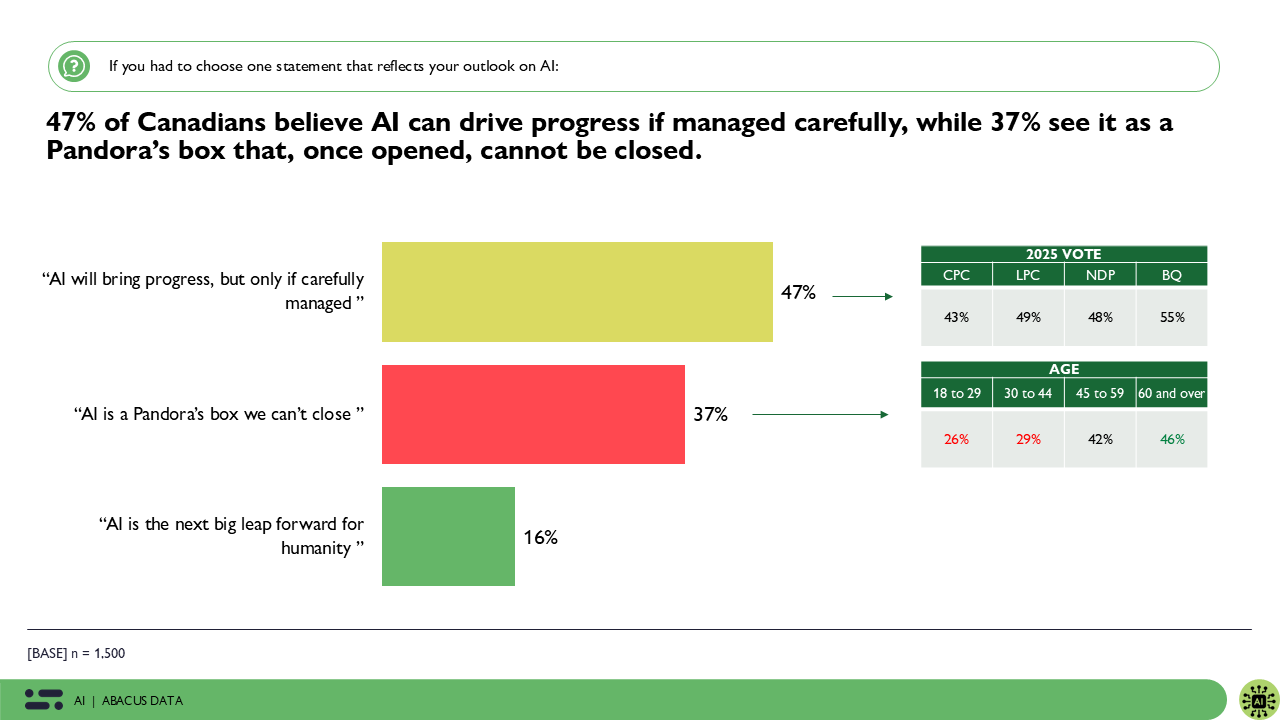
AI as a Threat or a Tool
A majority of Canadians (61%) believe AI poses a threat that could harm employment, personal privacy, and the stability of Canadian society. In contrast, 39% see AI as a powerful tool to improve life in Canada.
Older Canadians are particularly wary, with 71% of those aged 60+ viewing AI as a threat. Women are also more cautious (67%) than men (45%), while younger Canadians (49% of those aged 18-29 and 50% of those aged 30-44) are more optimistic than those older, seeing AI as a potential driver of progress.
This skepticism cuts across political lines, with supporters of all three major federal parties sharing similar concerns: 61% of Conservatives, 58% of Liberals, and 69% of NDP supporters agree that AI could harm jobs, privacy, and stability.
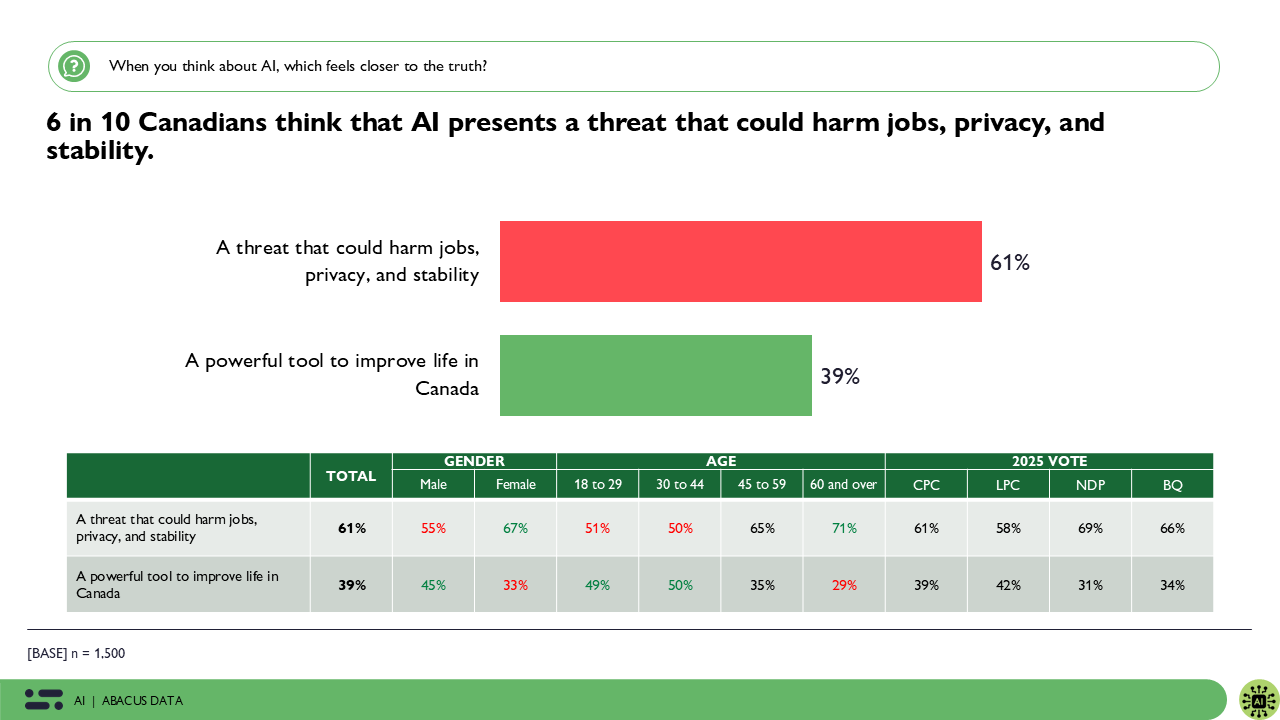
Where Canadians See the Most Potential
Despite these fears, Canadians see opportunities for AI to improve key parts of society. They believe its greatest potential lies in healthcare (37%), followed by business productivity (33%) and education (29%).
Younger Canadians stand out for their optimism: among those aged 18-29, 43% see AI improving business productivity and 44% see potential in education and personalized learning. In contrast, older Canadians are far more skeptical, with many believing AI will have no positive impact.
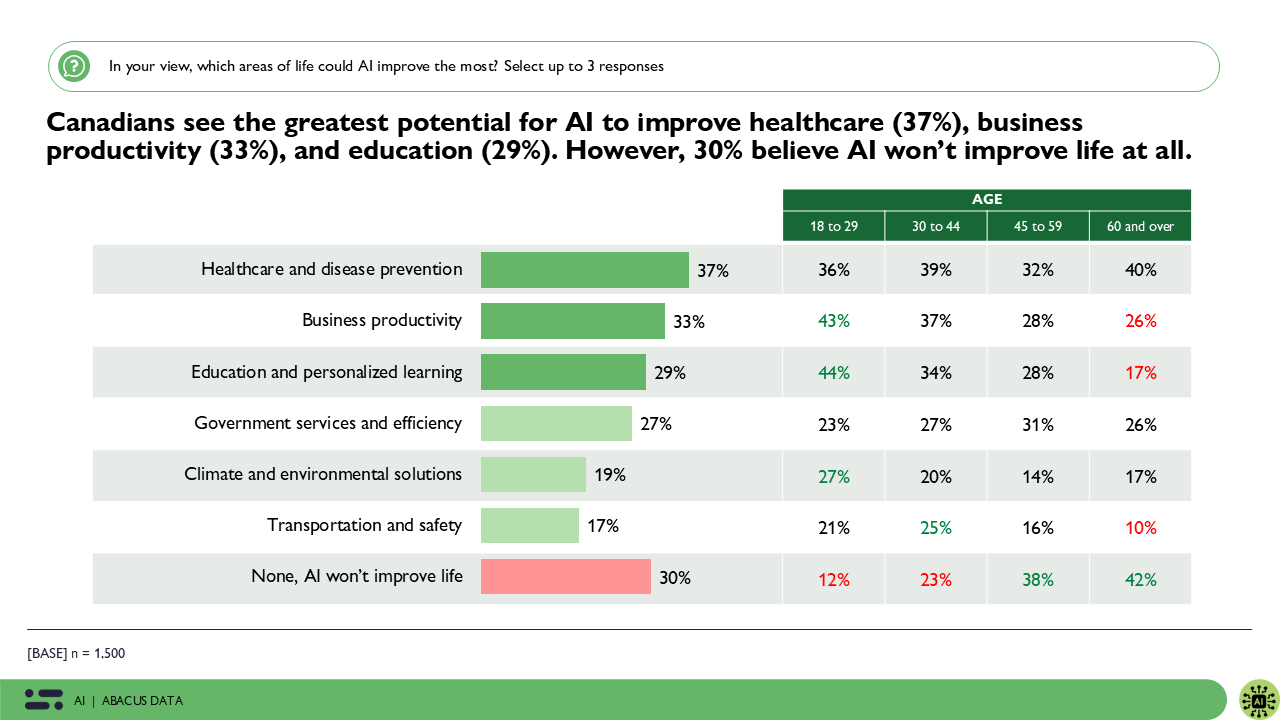
Trust in the Federal Government
Canadians are sharply divided on whether the federal government can be trusted to oversee AI in a way that protects the public: 48% express trust, while 52% do not.
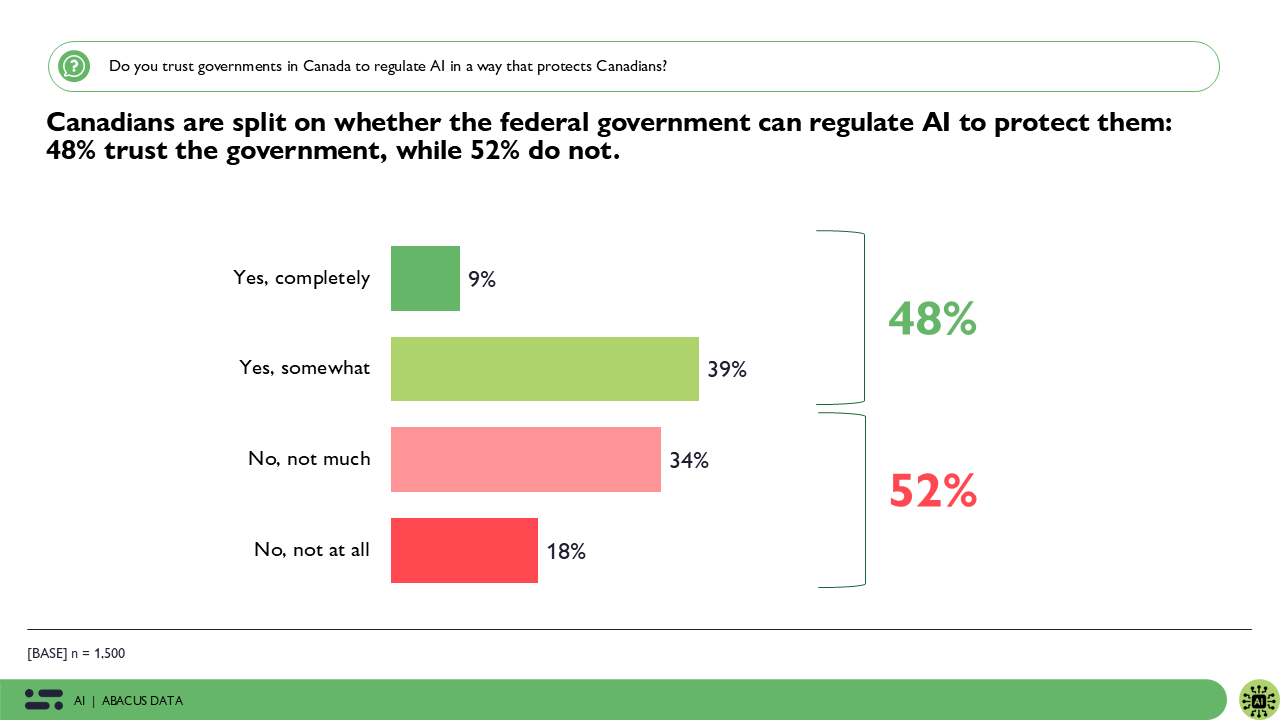
Trust is far from evenly distributed. Younger Canadians (62%) and Liberal voters (62%) are significantly more likely to believe the government will regulate AI effectively. In contrast, older Canadians (62%), women (57%), and Conservative voters (65%) express the highest levels of distrust.

This fragile foundation of public confidence suggests that building trust will require more than regulation alone. Canadians need clear communication, transparency, and tangible action to feel reassured that AI will be managed responsibly.
Finding the Right Balance in AI Regulation
While Canadians are divided on whether to trust government, most agree on what regulation should look like. A strong majority (73%) believe AI rules must strike a balance between safety and innovation, rejecting both extreme restrictions that could stifle progress and a hands-off approach that could invite risk.
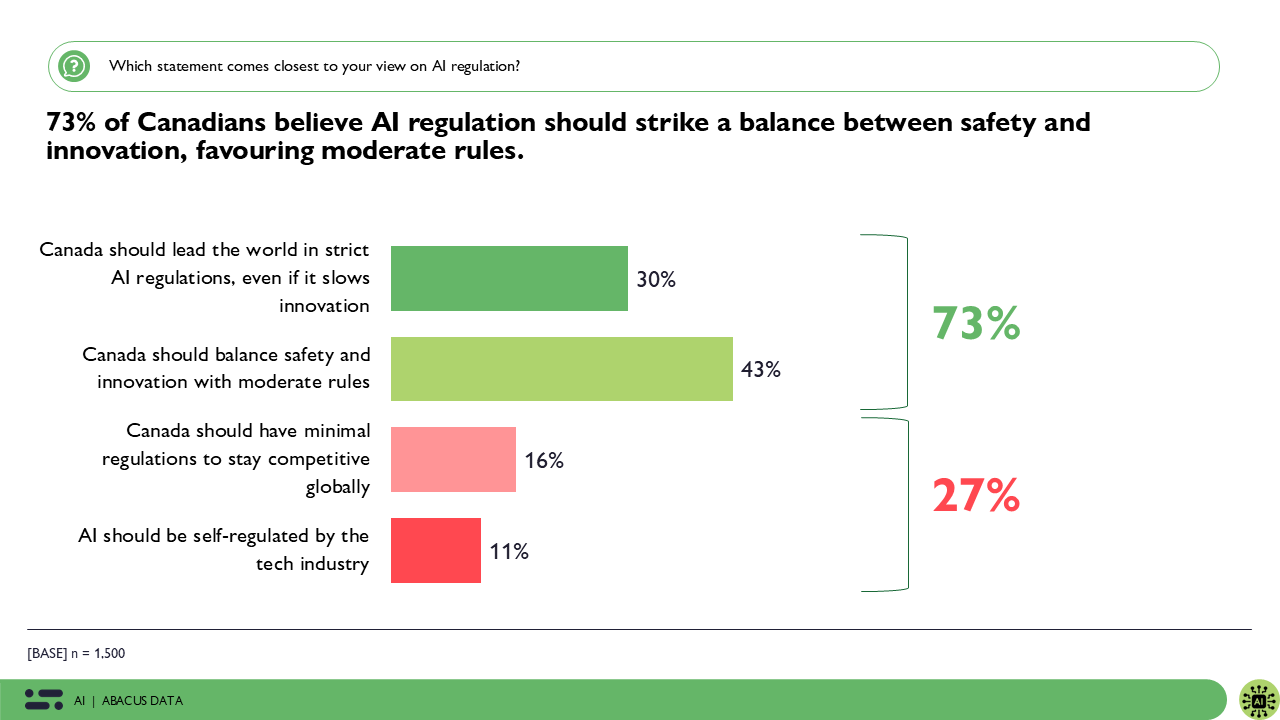
This consensus cuts across political lines, with widespread agreement among Conservatives (71%), Liberals (73%), and NDP voters (80%). Canadians are sending a clear message: they want thoughtful, moderate rules that protect people while encouraging innovation.
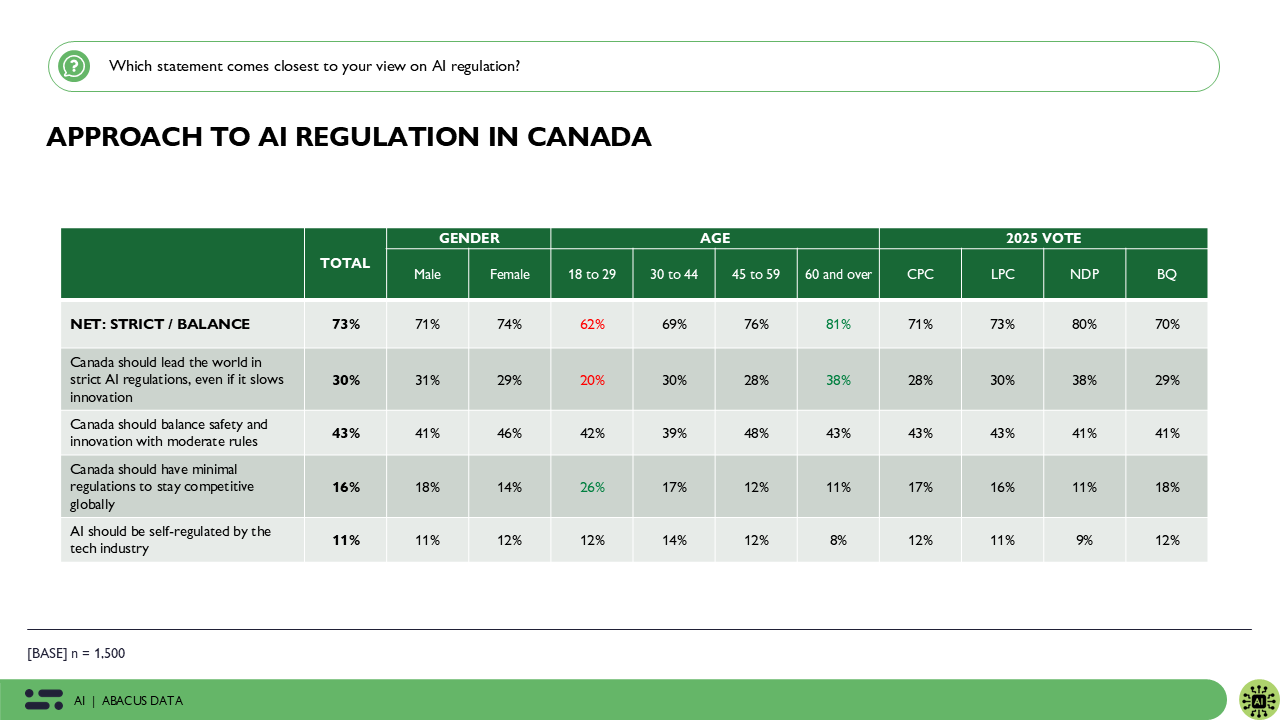
Who Should Control AI in Canada
With a strong demand for balance, the question becomes who should lead Canada’s AI strategy. A plurality of Canadians (34%) believe the federal government should take the lead, while just 19% trust tech companies to do so.
This reflects skepticism toward private industry, as many Canadians are wary of leaving powerful technologies in the hands of corporations driven by profit rather than public interest. However, given the fragile trust in government, the challenge is clear: people want government oversight, but they aren’t fully confident any institution is ready to manage AI’s risks.
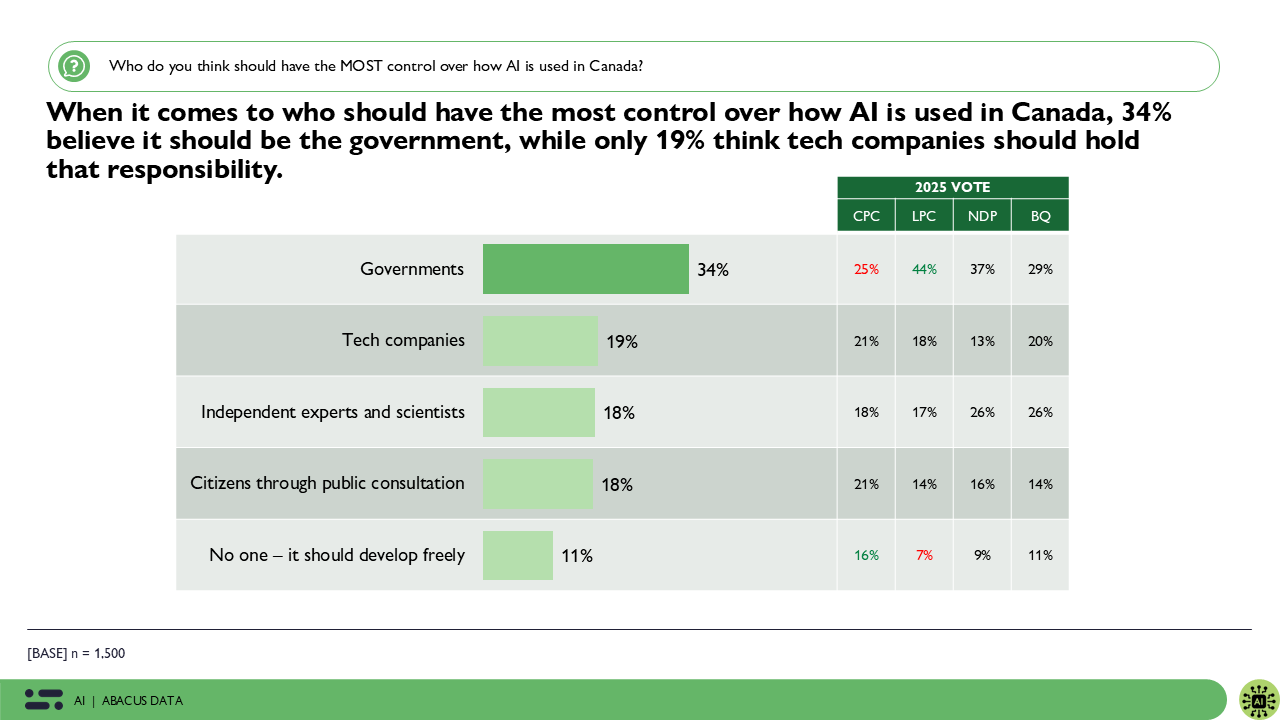
Preparing for Job Displacement
As AI continues to advance, the threat of widespread job loss is a top concern for Canadians. Voters are looking to government for policies that soften the economic and social impact of this disruption.
The most popular solution is a basic income guarantee (32%), ensuring displaced workers can maintain financial stability. Another 26% want major investments in re-skilling programs to help people transition into new careers, while 22% support limits on how quickly companies can adopt AI to give workers and communities more time to adapt.
These results send a strong message to policymakers – Canadians expect government to lead in managing the human cost of AI, not just its technical and economic implications.
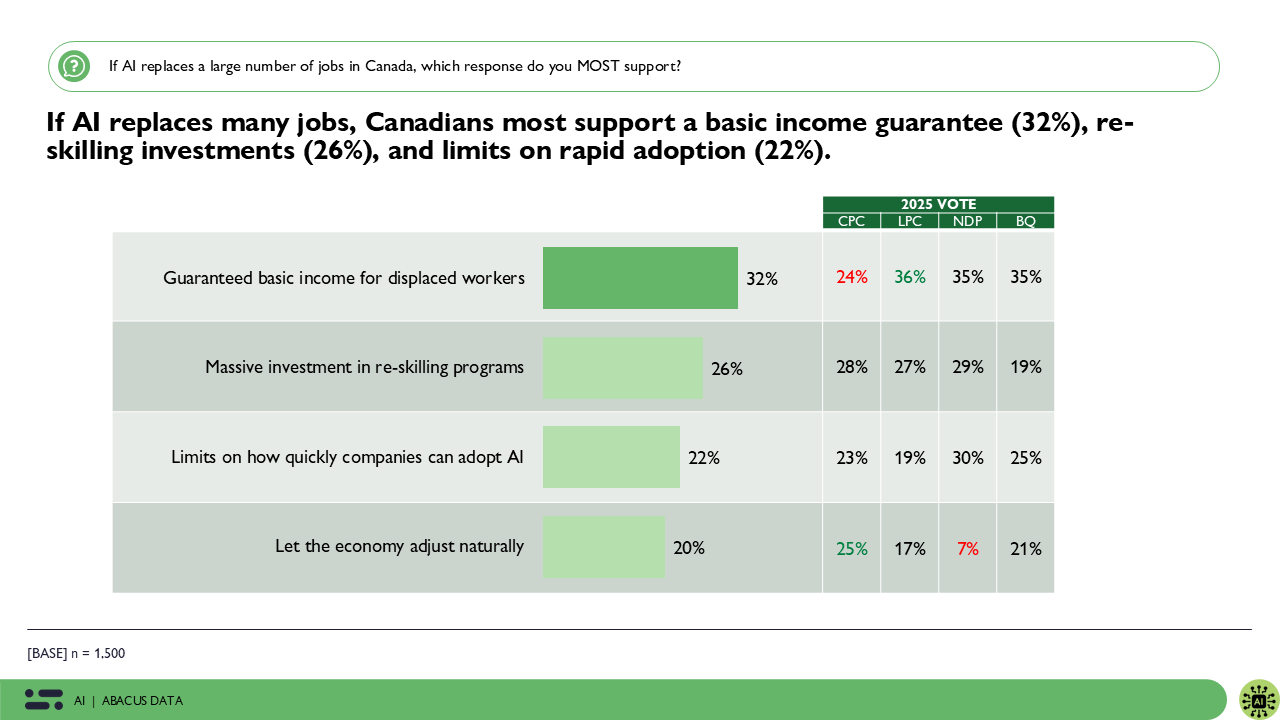
The Upshot
Artificial intelligence is no longer an abstract concept on the horizon – it is here. It is reshaping economies, industries, and communities at a pace that few fully understand. For Canadians, this rapid shift brings both excitement and deep unease. There is a clear recognition that AI has the potential to transform healthcare, education, and productivity, but also a profound fear that it could disrupt jobs, threaten privacy, and destabilize society.
At the heart of this tension is uncertainty. Canadians don’t yet know what AI will mean for their lives, and they are unsure whether anyone – government or industry – can manage its risks. While many want government to take the lead, trust is fragile. People are looking for leadership that not only sets rules but also demonstrates, through action, that AI can be guided responsibly. Without this, skepticism will grow, and public support for innovation will falter.
As the Carney government signals its intention to make AI a cornerstone of its agenda, the challenge will be to move decisively while bringing Canadians along. Regulation must strike the right balance: protecting people and communities while allowing innovation to thrive. Canadians will also expect more than guardrails – they will want to see investments that help workers adapt, families stay secure, and communities withstand the disruptions AI will bring.
AI is a movement that cannot be stopped, but how it unfolds in Canada is still an open question. The government’s task now is to build trust and demonstrate that progress is possible without leaving people behind. The stakes are high: get it right, and AI can become a force for shared prosperity; get it wrong, and it risks becoming a source of fear and division.
Methodology
The survey was conducted with 1,500 Canadian adults from August 28 to September 2, 2025. A random sample of panelists were invited to complete the survey from a set of partner panels based on the Lucid exchange platform. These partners are typically double opt-in survey panels, blended to manage out potential skews in the data from a single source.
The margin of error for a comparable probability-based random sample of the same size is +/- 2.53%, 19 times out of 20.
The data were weighted according to census data to ensure that the sample matched Canada’s population according to age, gender, educational attainment, and region.
This survey was paid for by Abacus Data.
Abacus Data follows the CRIC Public Opinion Research Standards and Disclosure Requirements that can be found here: https://canadianresearchinsightscouncil.ca/standards/nities are equally significant. In a period where trust is scarce, those who can provide credible reassurance and demonstrate tangible value will can shape public opinion and the pressure placed on our policy makers.
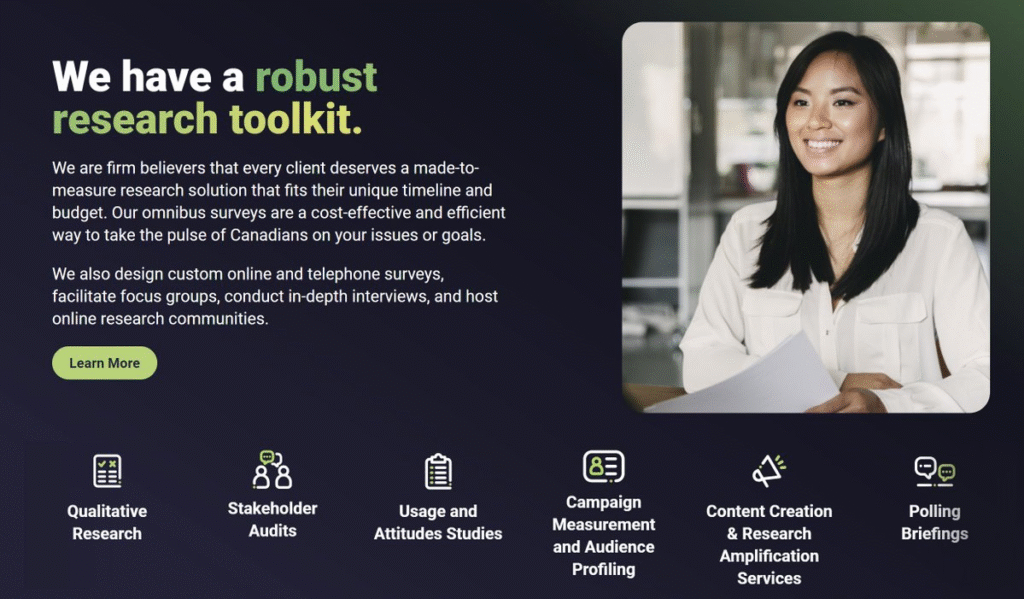
ABOUT ABACUS DATA
We are Canada’s most sought-after, influential, and impactful polling and market research firm. We are hired by many of North America’s most respected and influential brands and organizations.
We use the latest technology, sound science, and deep experience to generate top-flight research-based advice to our clients. We offer global research capacity with a strong focus on customer service, attention to detail, and exceptional value.
And we are growing throughout all parts of Canada and the United States and have capacity for new clients who want high quality research insights with enlightened hospitality.
Our record speaks for itself: we were one of the most accurate pollsters conducting research during the 2025 Canadian election following up on our outstanding record in the 2021, 2019, 2015, and 2011 federal elections.
Contact us with any questions.
Find out more about how we can help your organization by downloading our corporate profile and service offering.



